June 17, 2025 | 13:53 GMT +7
June 17, 2025 | 13:53 GMT +7
Hotline: 0913.378.918
June 17, 2025 | 13:53 GMT +7
Hotline: 0913.378.918
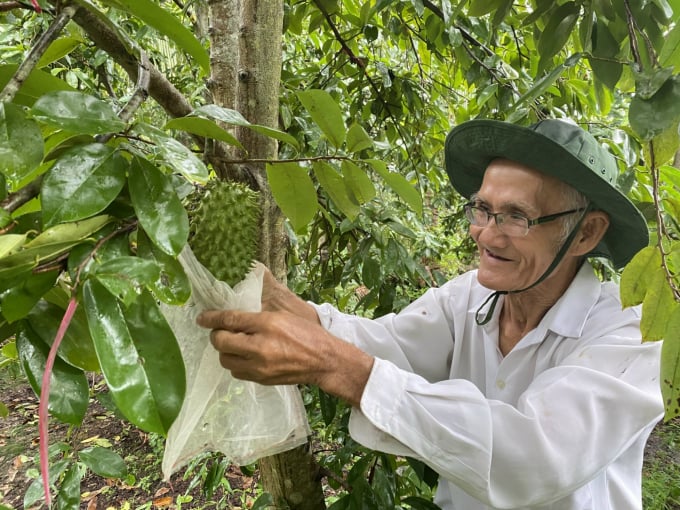
Hau Giang province has 203 agricultural cooperatives in total, but there are only more than 5,700 member households. Photo: Hoang Vu.
We met Mr. Ngo Minh Long, Chairman of Hau Giang Cooperative Alliance in a room full of slogans of collective economy’s mission and vision. “It may seem like any other ‘movement’, but it’s actually the real thing,” said the man with a big heart for collective economy in Hau Giang.
Hau Giang is one of the pioneers in the Southwest to establish cooperative unions in order to make a connection between cooperatives: Two fruit cooperative unions, one rice cooperative union and one cooperative union in the fisheries sector. Hau Giang MeKong Fisheries Cooperative Union has just been established in early April with seven cooperative members, but at the end of the month Xa No MeKong Rice Cooperative Union is founded including 30 member cooperatives with an area of 40,000 ha of rice. Just a few days ago, the Mekong Fruit Export Cooperative Union has just been established according to the wishes of 21 small-scale cooperatives.
“Our spirit is high because we are well aware of the difficulties and obstacles on the way to building collective economy. In the context of shortcomings and limitations in management, organization, thinking and perception of both cadres and people, if we do not stand together, probably nothing could be done.”
The whole province has 203 agricultural cooperatives, but there are only more than 5,700 member households. It means there are less than 30 households in a cooperative on average. “Everyone says that if a cooperative wants to develop, it must be based on a large scale, and the first customers must be the members of that cooperative. How can it be a cooperative if there are only thirty to forty members, with an area of only a few dozen ha? how can we even organize production?”
Not to mention a fact in many agricultural cooperatives today that the heads are commonly old men of seven or eighty years old, not having much energy and enthusiasm left, let alone talking about connection, market access, and digital transformation. Despite trying to change and revolution, only 30% of the 203 agricultural cooperatives in Hau Giang are operating effectively.
Of course, that is also the general situation of many localities, but changes in policies and regulations are definite in the near future. Mr. Long believes that in order to develop collective economy, the first thing is to get rid of the thought of "lazing around waiting for a windfall". The people must have ambition and effective models that stay close to reality.
“Unlike many provinces, Hau Giang builds a collective economic development strategy in the reverse process. That is choosing the form of cooperative union, selecting the "nuclear" cooperatives with a market available and then creating linkage to organize production, build raw material areas, and become a sustainable chain. The OCOP biological fruit cooperative model in Nga Sau town, Chau Thanh district is a prime example."
After that, Mr. Long picked up the phone and introduced me to Tran Ba Son - Director of the OCOP Biological Fruit Cooperative and Chairman of the Board of Directors of the Mekong Fruit Export Cooperative Union.
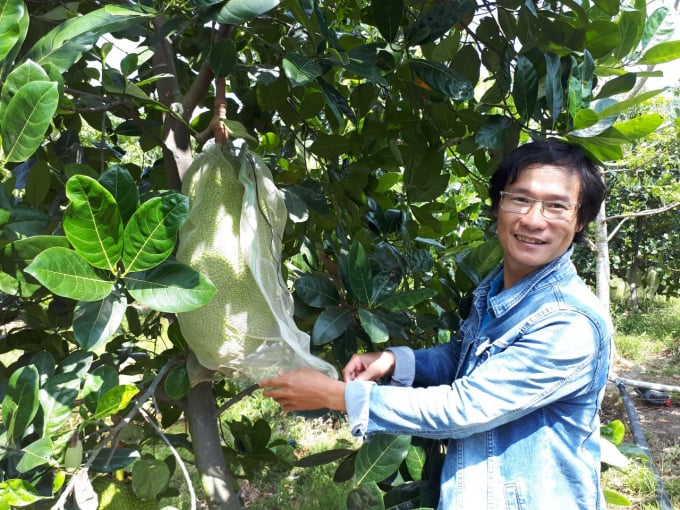
Director of OCOP Biological Fruit Cooperative - Chairman of the Board of Directors of MeKong Union of Export Fruit Cooperatives Tran Ba Son. Photo: Hoang Vu.
We were a bit skeptical about this cooperative that has become the "nucleus" of this cooperative alliance after 2 years of establishment, but our doubts are lessened when we clicked on biofruitcoop.com. The website had a fairly modern design, available in both English and Vietnamese. In addition to the slogan "For the development of Vietnamese farmers", there was a brief introduction: Bio Fruit Coop (BFC) was established by leading experts in Vietnam's agricultural sector. And it turned out that BFC’s experts were actually quite young. No one had reached the age of 40.
“We were originally a group of 11 brothers, working together in a pretty famous Dutch agricultural enterprise in Vietnam. The salary was indeed high, but every day we talked to each other and often asked ourselves: Why do we have to work for other people in our own country like this? Farmers, including our parents, worked hard to make pomelos and lemons while having to take risks, but why was the profit only so little?”
“We kept thinking and thinking, and finally we brothers quit the job together. At first we planned to establish a company, but the brothers said if the goal was to share benefits with farmers, only the cooperative model is suitable. And so in March 2020 Bio Fruit Coop was born.”
It was up to this moment we finally what Mr. Long had said. BFC was truly different.
First of all, the people in the BFC team were young and skilled. The board of directors consisted of three people, two of whom held a master's degree. Chairman of the Board of Directors Nguyen Van Dung, who was an international student, could speak both English and French fluently. Director Tran Ba Son also held a master's degree. Among the 95 initial capital contributors, there were 9 people with technician qualifications. Perhaps ít was only thanks to such a wealth of knowledge that after only 5 months of establishment, despite the complicated progress of Covid-19 pandemic, in August 2020 Bio Fruit Coop became the first cooperative in Vietnam to have a 20-ton batch of seedless lemons exported to the UK.
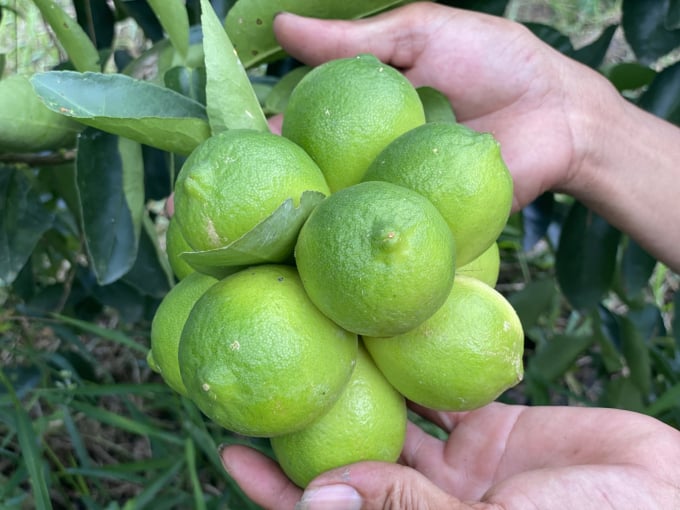
Bio Fruit Coop's seedless lemon products conquer meticulous markets. Photo: Hoang Vu.
The next thing was their way of work. “Based on the available knowledge, we build cooperatives with a transparent and clear vision in mind, not following the old-fashioned vague model. Having determined the key point is the market connection stage, we find customers first, then link with members, organize production according to the standards required by customers.”
From the initial 15 ha linked with 4 households, Bio Fruit Coop is now a cooperative with 265 farmer households linked on an area of 300ha in the districts of Chau Thanh, Phung Hiep, Long My and Nga Bay city. Seedless lemons, Nam Roi pomelos, green-skinned pomelos, dragon fruits, and coconuts from the gardens of people associated with the cooperative continuously go into high-class supermarkets in countries such as the UK, Germany, the Netherlands, Turkey, and Poland.
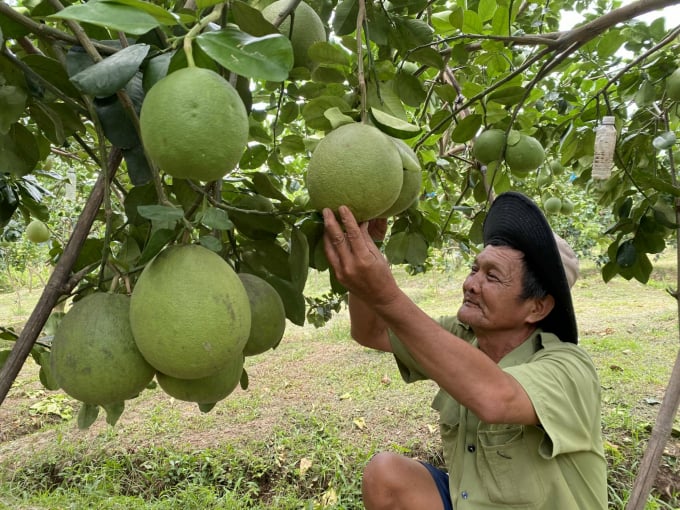
The cooperative union was first to connect, then share markets and customers so that cooperatives could do business together. Photo: Hoang Vu.
Back to the story of the establishment of the Mekong Fruit Export Cooperative Union, of course there are many difficulties ahead, but more than anyone, perhaps the new Chairman of the Board of Directors Tran Ba Son is the happiest.
Son is happy because he has fulfilled his wish to make a place where everyone can sit down together. Because in the past the province was known to have many fruit cooperatives with more than 40,000 ha of arable land, but almost everyone produced and sold products by themselves and their own method.
”Establishing a cooperative union is first to connect and share markets and customers so that they can do business together, then later organize production, improve farming skills, and ensure unity in product quality standards. Thinking a bit further, cooperatives in the union share the management and administration in the direction of modernity together. There are clear tax reports, audits, regulations and standards for managers. If you want to do big business, you have to grow up together like that, step by step raising the level of organizations, people, and services, so that your products can travel the world.”
I asked Son many times about Bio Fruit Coop’s lesson to success. The young director gently smiled.
“As soon as we get our hands on the work, we agreed on one development philosophy: ‘Having farmers as the center. The success of Bio Fruit Coop today is all thanks to this philosophy.
“The people are the most important subject to create export goods and decide their quality. Placing farmers as the center of focus to provide technical guidance, change farming practices, and train production knowledge help the quality of products associated with the cooperative show significant improvement," Son said.
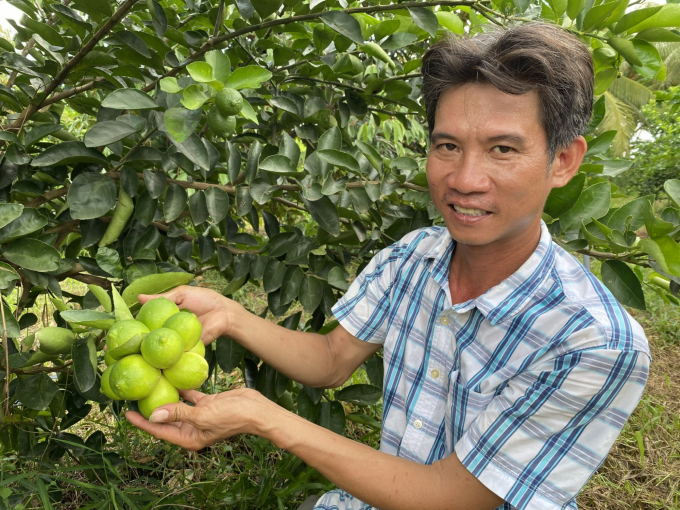
Bio Fruit Coop has not only changed the people’s farming habits but also helped them feel secure producing on their own land. Photo: Hoang Vu.
The linked 300 ha of fruit gardens are divided into 9 regions. The cooperative invests in fertilizers, plant protection drugs, seeds and assigns a team of technicians to directly guide farmers in farming. Each associated household has about 1-2 ha of seedless lemon trees on average, producing approximately 25 tons a year, and the cooperative will underwrite output products for VND 15,000/kg. After deducting all costs, each household still earns a profit of VND 350 - 400 million/ha.
In just 1-2 years, people's mindset about the collective economy has completely changed. By linking "input investment and output underwriting", Bio Fruit Coop has not only changed the people’s farming habits but also helped them feel secure producing on their own land. This change is something much more precious and meaningful than economic profit.
Translated by Samuel Pham
![Turning wind and rain into action: [5] Hue applies modern technology in disaster forecasting](https://t.ex-cdn.com/nongnghiepmoitruong.vn/608w/files/news/2025/06/17/z6704423696987_15fd32ffc26d590d204d520c9dac6786-nongnghiep-093938.jpg)
(VAN) In Hue city, modern technology has recently been applied in meteorological and hydrological forecasting and warning, helping to reduce the damage caused by natural disasters.

(VAN) A cutting-edge farming technique being implemented on an experimental ranch in Arizona's Sonoran Desert has already saved a billion gallons of water over five years, according to Civil Eats.

(VAN) Poultry and pig production and the environment can be boosted through enhanced water technology, according to new research.
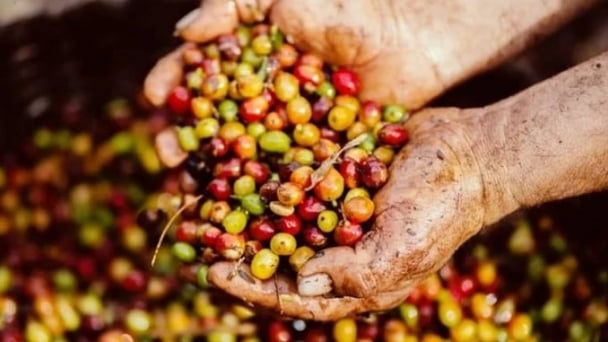
(VAN) Coffee prices on June 16, 2025 are unchanged. In Vietnam, local trading prices are holding steady, ranging around VND 112,000 – VND 112,500/kg.
![Turning wind and rain into action: [4] Bringing climate bulletins to remote and isolated areas](https://t.ex-cdn.com/nongnghiepmoitruong.vn/608w/files/linhnhp/2025/06/14/1152-z6704423696987_15fd32ffc26d590d204d520c9dac6786-nongnghiep-151141.jpg)
(VAN) The Vietnam Agriculture and Nature Newspaper interviewed Mr. Vu Thai Truong, Acting Head of Climate Change and Environment at UNDP Vietnam, to gain deeper insight into how climate bulletins are delivered to farmers.

(VAN) In Tien Giang, a high-tech shrimp farm has developed a distinctive energy-saving farming model that has yielded promising results.
![Turning wind and rain into action: [3] 300.000 farmers benefit from agro-climatic bulletins](https://t.ex-cdn.com/nongnghiepmoitruong.vn/608w/files/news/2025/06/12/e5a48259d6a262fc3bb3-nongnghiep-125122.jpg)
(VAN) The agro-climatic bulletin has become a valuable tool for farmers in the Mekong Delta. After more than five years of implementation, the initiative is gradually being expanded nationwide.